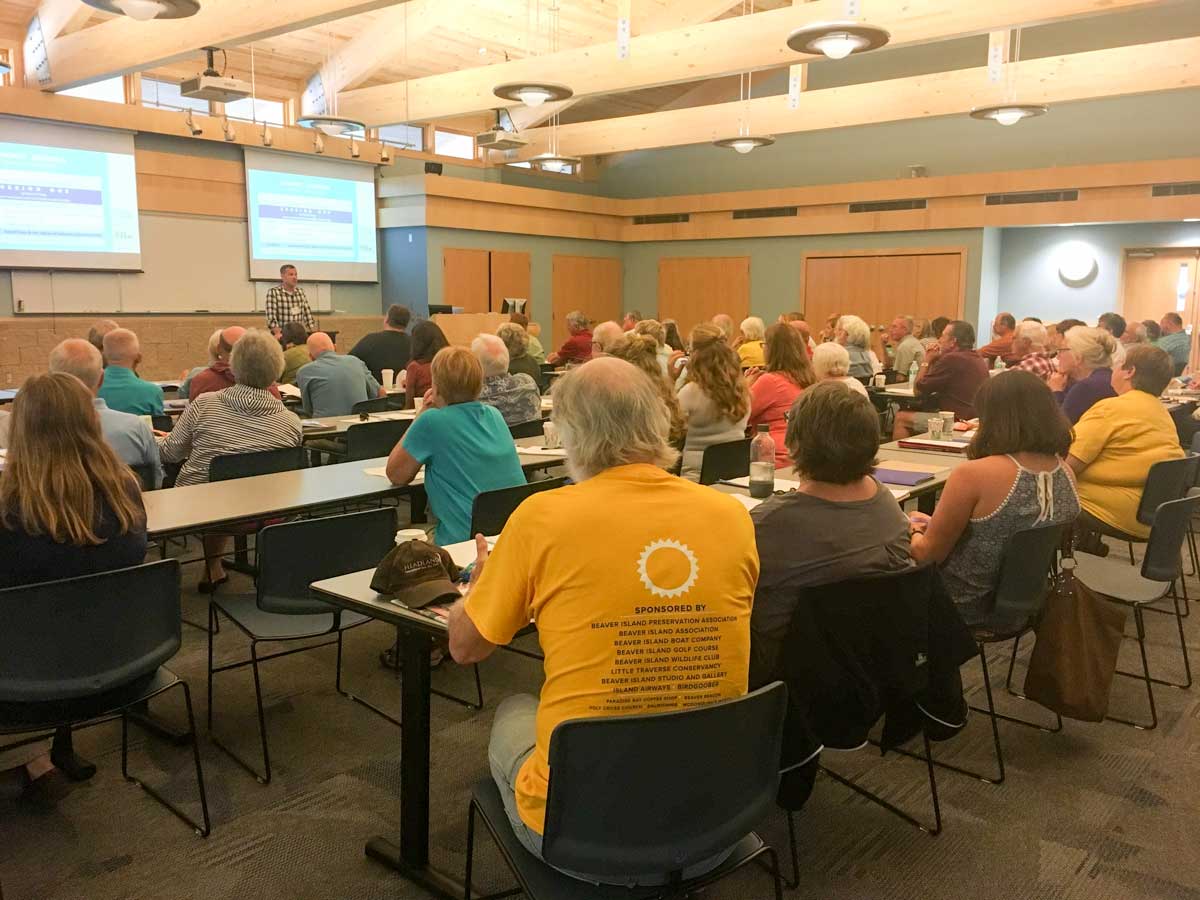BEAVER ISLAND, MI—Two representatives from Manitoulin Island, and this newspaper, attended the first-ever Islands Summit themed ‘Laying the Foundation for a Great Lakes Islands Coalition,’ and left the two-day conference hosted by Beaver Island and the Michigan Office of the Great Lakes with a renewed sense of pride in Manitoulin and our Great Lakes home.
“It was a wonderful two days spent on Beaver Island, in quite literally the middle of Lake Michigan,” said Expositor publisher Alicia McCutcheon, who attended the Islands Summit with her mother, Julia McCutcheon.
There were over 70 attendees representing 11 Great Lakes islands. Facilitating the event were representatives of The Island Institute, based in Maine; the Michigan Office of the Great Lakes and the Beaver Island community.
Maine’s The Island Institute started in 1983 to provide forestry and conservation services to landowners on Maine islands but has grown to support and maintain the year-round communities on these Maine islands, the Institute’s website states. “That work has evolved over the years and now encompasses six work areas: community development, economic development, education, energy, marine resources and media.” It boasts a staff of 50 and has an annual operating budget of over $5.5 million and has branched out to help other islands across the United States.

Brandon Hofstedt of Michigan’s Northland College Center for Rural Communities presented a summary of island data and the value of indicators. He noted that approximately 21,000 people populate all the Great Lakes islands year-round with their collective population growing to 50,000 seasonally. These islands also attract over two million visitors a year and have an estimated $200 to $400 million economic impact on the Great Lakes region, he told the group assembled at the Central Michigan University biological research station.
Mr. Hofstedt said that with the islands coming from both sides of the border, plus their combined economic clout, an island coalition could make for a good lobbying presence.
Karen Burns of The Island Institute spoke to the group regarding its role and its Island Fellows program. A fellow is chosen and becomes part of an island community for a one- or two-year stint and helps that island build capacity; bolster its emergency training, work with historical societies; or “gather energy around volunteer recruitment.” Island Fellows are tasked with integrating into the community at every level.
This year there are nine Island Fellows spread across Maine and Michigan, Ms. Burns explained, introducing Beaver Island’s fellow Stefanie Burchill.
“Each of the islands had a chance to stand up and give a quick five-minute overview of their island,” Ms. McCutcheon explained. “Five minutes didn’t seem nearly long enough to explain Manitoulin, but we made it work,” she laughed.
“Manitoulin is wildly different from the other Great Lakes islands,” she added, “and that became evident very quickly, but we all share a passion for the particular island we call home and we all want the best for our people.”
The islands represented at the Islands Summit were Beaver Island, Lake Michigan (USA), population 584; Mackinac Island, Lake Michigan (USA), population 481; Drummond Island, Lake Huron (USA), population 1,126; Harsens Island, Lake Michigan (USA), population 1,145; Neebish Island, St. Mary’s River (USA), population 89; South Bass Island and Middle Bass Island, Lake Erie (USA), population 625; Pelee Island, Lake Erie (Canada), population 171; Manitoulin Island, Lake Huron (Canada), population 13,048; Madeline Island, Lake Superior (USA), population 261; and Washington Island, Lake Michigan (USA), population 843.
“Manitoulin’s population is far, far greater than all of the islands and we are also bridged, which seemed to be slightly contentious for some people in attendance,” Ms. McCutcheon noted. “My mother and I pointed out that the bridge does swing and that while having the swing bridge in Little Current is all well and good for the people of Little Current and surrounding areas, it doesn’t mean the people of, say Meldrum Bay or Western Manitoulin, may feel any less isolated.”
All the other islands have ferry services, some year-round and some not. Many rely on charter flight services. Some have schools, varying from up to Grade 8 or to Grade 12, while some islands do not even have a grocery store or a gas station, the McCutcheons explained.
“All of the islands spoke of their frustration with broadband service and all of them spoke of the importance of tourism to their economy,” Ms. McCutcheon added. “Manitoulin is the only island that does not rely solely on tourism for its economy.”
“The Summit made us feel incredibly thankful to live on Manitoulin,” Ms. McCutcheon said. “I’m sure all of the islands are equally beautiful and special, but we are so fortunate to live in a place that boasts an excellent healthcare system, school system, a vibrant island economy, and even paved roads, as well as our unique shared culture.”
“In our closing remarks at the Islands Summit I noted that while many of the islands began their spiel by noting the spiritual and territorial importance of their islands to the First Nations or Tribes of the area, the lack of Indigenous representation on Beaver Island was slightly unsettling,” Ms. McCutcheon said. “I spoke to the fact that the Great Lakes First Nations people are the stewards of the land and water here and the importance of having their voice represented at the table. It obviously had an affect on some of the islands as we had many people come up to us afterwards to thank us for bringing it up, noting that they would make more of an effort on their own islands, moving forward, at inclusiveness.”
When broken into groups, the islands were asked to write down their challenges and successes on various topics and the McCutcheons say they were able to note many Island successes, including in health, Manitoulin’s ability to attract and maintain healthcare professionals, which has even been noted by the national press, community paramedicine and the non-urgent patient transfer vehicles as unique pilot programs that could be adopted by other island communities; for environment, the success of Manitoulin Streams and spinoffs such as the invasive species intern; and for tourism, the push toward eco-tourism and the First Nations leading the way in that regard, an abundant arts scene “and so much more. We really do have a lot to be proud of here.”
Ms. McCutcheon said they also came away with the thought that was first noted by Jim Nies, a summer resident of Kagawong, that perhaps Manitoulin does not think of itself as an island enough.
“The people of the other Great Lakes islands wear many hats from tourism operator to paramedic to teacher, in some cases,” Ms. McCutcheon said. “Having small populations and being isolated has made them come together and find solutions to problems. It was observed to me before I left for the conference how Manitoulin is comprised of many silos, our seven municipalities, six First Nations and one unorganized township and oftentimes we do not work together nearly enough. Things like waste disposal and composting, even what to do with old cars, is amplified on islands and Mr. Nies is right—we should be thinking more like an island, especially when it comes to our environment and being good stewards of the land.”
Matt Preisser of the Michigan Office of the Great Lakes explained that his boss, Jon Allan, became aware of The Island Institute and thought how the Great Lakes islands, specifically those in Michigan, could benefit from just such a model and thus began a relationship between the Michigan Office and the group in Maine which eventually led to an exchange between Beaver Island community members to the Maine islands thanks to a grant through the Michigan Office of the Great Lakes.
“We realized that (Great Lakes islands) have a very unique set of challenges and mainland decision makers have no clue as to what those challenges are and also that the other islands really don’t communicate much with one another,” Mr. Preisser said.
Mr. Preisser says his office sees itself as a “leader in Great Lakes management” and decided to call a meeting and “see who showed up; have islanders meet other islanders and if there was a value to having something like a coalition then we would help to facilitate it.”
It was Beaver Island that suggested reaching out to the other islands and, not itself having the capacity to do so, the Michigan Office of the Great Lakes kindly agreed to help them take that task on.
“We’re pretty confident that it was a good idea,” Mr. Preisser said of the Islands Summit.
He noted that one of the islanders brought up the fact that an islands coalition could also work as a preventative measure. If one island had an issue or tried something that failed, another island could learn from those mistakes. “That could be a really great function before it happens,” he said.
Moving forward, Mr. Preisser admitted to having much work ahead of him in terms of summarizing the many shared ideas that came out of the summit and will be putting forward regular communication via emails between the islands and creating a charter for an islands coalition leading up to the fall of 2018 and the next summit, which will be hosted by Madeline Island in Lake Superior.
The McCutcheons say it was a worthwhile trip to Beaver Island, commenting on the gracious hosts of that island, and the hopes for a relationship with the islands through the creation of a coalition in the future that could aid in lobbying all levels of government on both sides of the border regarding the health of the lakes, and its people.
“I feel that Manitoulin should be represented in this movement,” Ms. McCutcheon added. “We aren’t sure what the next steps will be, but we need to be at the table.”




